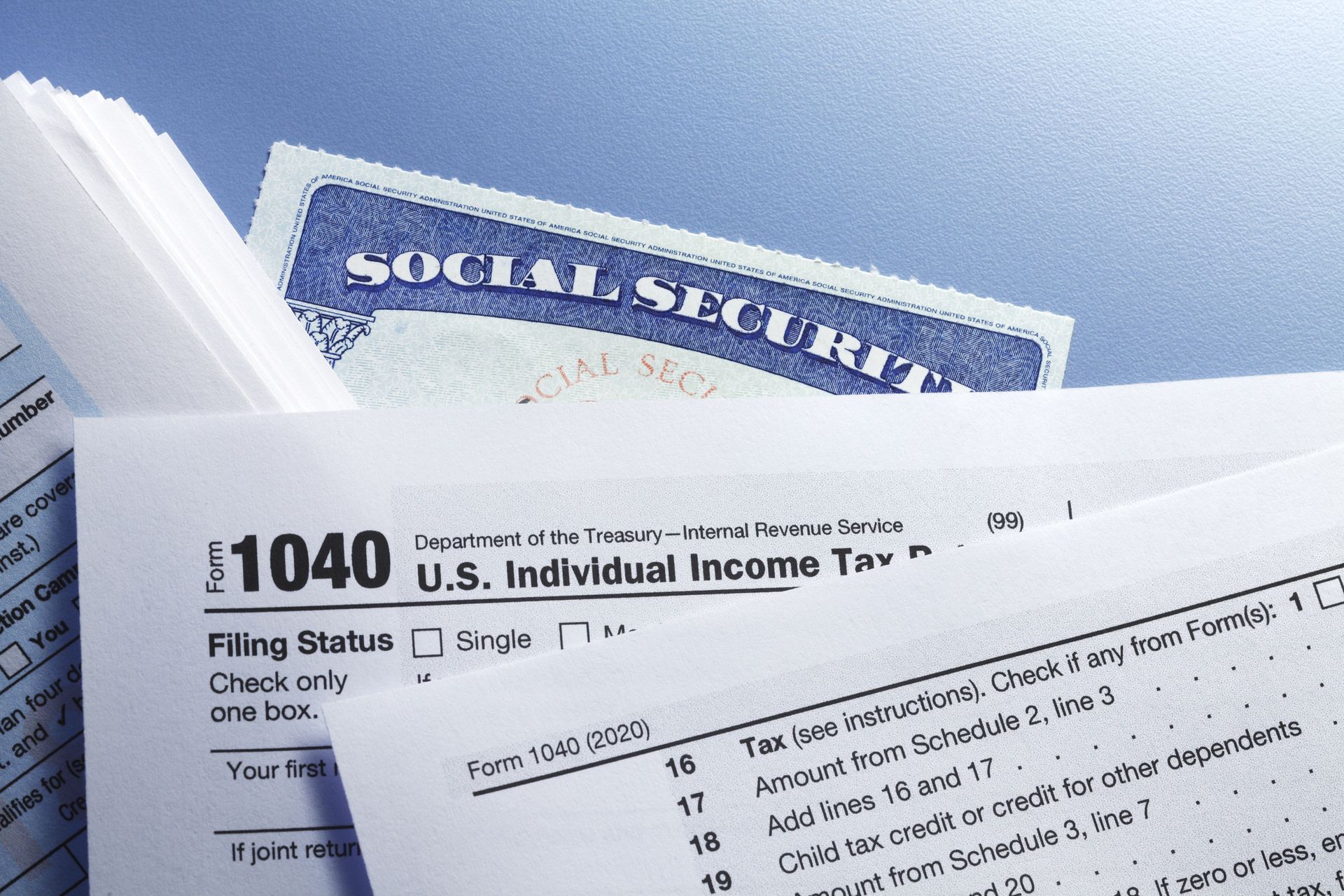Calculating Taxes on Social Security Benefits
The federal government can tax up to 85% of your Social Security benefits, so it's good to know how those taxes are calculated.


It may come as a surprise, but Social Security benefits are not entirely tax-free. Depending on your income, up to 85% of your Social Security benefits can be subject to tax. That includes retirement and benefits from Social Security trust funds, like survivor and disability benefits, but not Supplemental Security Income (SSI).
The chance of paying taxes on your Social Security benefits is higher when you have significant taxable income from a job, pension, or traditional IRA, for example. However, many people who only have income from Social Security don’t pay income taxes on their benefits at the federal level.
Still, since like other forms of retirement income taxed by the IRS, taxes on Social Security benefits are a possibility for retirees, it’s important to know how Social Security taxes are calculated.

Sign up for Kiplinger’s Free E-Newsletters
Profit and prosper with the best of expert advice on investing, taxes, retirement, personal finance and more - straight to your e-mail.
Profit and prosper with the best of expert advice - straight to your e-mail.
Related: Six Tax Breaks That Get Better With Age
How Social Security tax is calculated
Each January, after you begin receiving Social Security benefits, you will receive a statement (Form SSA-1099) showing the total benefits you received in the previous year.
When determining how much you may be taxed, the first step is to calculate your "combined income." The IRS says your combined income is your adjusted gross income (AGI) plus nontaxable interest and half of your Social Security benefits from the year. You then take away certain deductions and exclusions.
The following tiered system determines the percentage of your benefits that are taxable.
- If your combined income is under $25,000 (single) or $32,000 (joint filing), there is no tax on your Social Security benefits.
- For combined income between $25,000 and $34,000 (single) or $32,000 and $44,000 (joint filing), up to 50% of benefits can be taxed.
- With combined income above $34,000 (single) or above $44,000 (joint filing), up to 85% of benefits can be taxed.
If you need clarification on whether your Social Security benefits are taxable, the IRS has a tool on its website that can help. Once you know how much of your benefits are taxable, you must include that amount on Line 6b of Form 1040. That income will be taxable, along with any other income, based on your tax bracket and the income tax rate tied to it.
Tax on lump-sum payment from Social Security
When calculating taxes on your Social Security benefits, you should include the taxable portion of any lump-sum payment you received during the year. (That is true even if that payment includes benefits from a previous year.)
However, the inclusion might lower the taxable portion of your benefits. In that case, the IRS says you can elect to figure the taxable part of a lump-sum payment for an earlier year separately, using your income for the previous year.
Note: Lump-sum retirement benefits differ from lump-sum death benefits. It's important to note that no part of a lump-sum death benefit paid by the Social Security Administration (SSA) is taxable.
How to withhold taxes from Social Security payments
It's essential to plan ahead if you know that some of your Social Security benefits will be taxed. To avoid surprises, you can request that federal income taxes be withheld from your monthly payments. To do this, you must fill out Form W-4V and submit it to your local Social Security office. You can choose a withholding rate of 7%, 10%, 12%, or 22%. Withholding taxes from your Social Security payments is one way to cover your potential tax liability before Tax Day arrives.
If you prefer not to have taxes deducted from your monthly Social Security payments, you can make quarterly estimated tax payments. Regardless of the method, the goal is to ensure you have paid sufficient tax to avoid an underpayment penalty from the IRS when you file your income tax return.
State tax on Social Security benefits
In addition to federal taxes, some states tax Social Security benefits. However, the methods and extent of taxation vary.
For example, New Mexico technically taxes Social Security benefits, but many retirees will not pay a dime to the state on that income at tax time. That’s because recently passed state legislation provides higher income thresholds in New Mexico for exempting Social Security benefits.
Although you cannot have state taxes withheld from Social Security benefits, you might be able to make estimated state tax payments. Contact your state Department of Revenue for information about your state's estimated tax payment rules.
Related Content

To continue reading this article
please register for free
This is different from signing in to your print subscription
Why am I seeing this? Find out more here
Get Kiplinger Today newsletter — free
Profit and prosper with the best of Kiplinger's advice on investing, taxes, retirement, personal finance and much more. Delivered daily. Enter your email in the box and click Sign Me Up.

As the senior tax editor at Kiplinger.com, Kelley R. Taylor simplifies federal and state tax information, news, and developments to help empower readers. Kelley has over two decades of experience advising on and covering education, law, finance, and tax as a corporate attorney and business journalist.
-
Five Top Causes of Business Bankruptcy and How to Avoid Them
Drawing from experience, this article explores the five biggest reasons companies go bankrupt and provides insights into the lessons learned from these case studies.
By Stephen Nalley Published
-
 Best U.S. Cities for Renters 2024
Best U.S. Cities for Renters 2024What are the best U.S. cities for renters? Charleston, NC, Atlanta, GA, Sarasota, FL, McKinney, TX and Scottsdale, AZ lead the pack, according to a recent RentCafe report.
By Kathryn Pomroy Published
-
 The Taxes That Come out of Your Paycheck
The Taxes That Come out of Your PaycheckPayroll Tax Your take-home pay is often less than expected due to several payroll tax withholdings you need to know.
By Kelley R. Taylor Last updated
-
 Seven States Where Gas Tax Increased July 1
Seven States Where Gas Tax Increased July 1Gas Taxes Since July has arrived, drivers in several states are facing a gas tax hike.
By Kelley R. Taylor Last updated
-
401(k) Withdrawal Penalty Rule Changes for 2024
Tax Rules More people are taking early emergency withdrawals from retirement savings accounts. New rules might offer some relief.
By Kelley R. Taylor Last updated
-
 Summer Activities That Can Impact Your Taxes
Summer Activities That Can Impact Your TaxesTax Planning Certain summertime activities might help lower your taxable income.
By Kelley R. Taylor Last updated
-
HSA Contribution Limit Rising Again for 2025
Health Savings Contribution limits matter when it comes to maximizing your tax-advantaged health savings account.
By Kelley R. Taylor Last updated
-
Three IRS Tax Deadlines for June 17
Tax Deadlines There are some important June IRS tax deadlines you shouldn’t overlook.
By Kelley R. Taylor Last updated
-
New Colorado Tax Credit Offers Two Years Free College: What to Know
Tax Credits Thanks to a new tax credit, some Coloradans will soon have access to two years of free college tuition.
By Kelley R. Taylor Published
-
Roth 401(k) Changes: What You Should Know for 2024
Retirement Savings Key changes to Roth 401(k) account rules may affect your tax planning and retirement savings.
By Kelley R. Taylor Last updated





